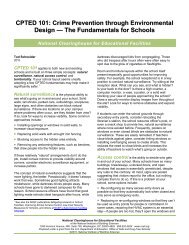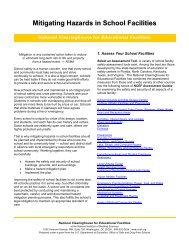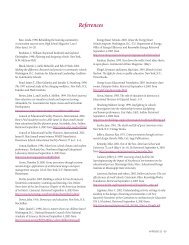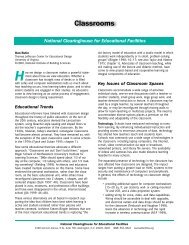Educational Facilities Disaster and Crisis Management Guidebook.
Educational Facilities Disaster and Crisis Management Guidebook.
Educational Facilities Disaster and Crisis Management Guidebook.
Create successful ePaper yourself
Turn your PDF publications into a flip-book with our unique Google optimized e-Paper software.
INTRODUCTION<br />
As a facility manager, you should be aware of your board’s<br />
policies <strong>and</strong> procedures. If equipment such as metal detectors<br />
or metal detecting w<strong>and</strong>s are used in your school or community<br />
college to prevent gun violence, you should be aware of your<br />
role, if any, in maintaining this equipment.<br />
Africanized Bees<br />
In 1956, researchers imported honeybees from Africa into<br />
Brazil in an effort to improve beekeeping in the New World<br />
tropics. These African bees were well suited to conditions in<br />
Brazil, <strong>and</strong> they began colonizing South America, hybridizing<br />
with European honeybees (hence the name "Africanized"<br />
honeybees) <strong>and</strong> displacing the European bees. Compared to<br />
docile European bees, Africanized honeybees are extremely<br />
defensive. Large numbers of them may sting people <strong>and</strong><br />
livestock with little provocation. They also take over European<br />
colonies by entering them <strong>and</strong> killing the resident queen.<br />
Africanized bees are sometimes called “Killers Bees,” not<br />
because of their stings but because they attack in massive<br />
swarms <strong>and</strong> can cause death. They eventually migrated to the<br />
United States in 1990 <strong>and</strong> are now found in much of the South.<br />
Precautions to take:<br />
# Use caution with power mowers - bees are<br />
sensitive to low-frequency vibrations; an enginedriven<br />
lawn mower may elicit a defense response<br />
from a hive or swarm.<br />
# Walk with care in clover <strong>and</strong> near picnic sites.<br />
# Avoid perfume, cologne, <strong>and</strong> scented cosmetics;<br />
foraging bees will seek out floral scents.<br />
# Beware of head-butting bees. Honeybees usually<br />
have a small number of sentry bees patrolling the<br />
perimeter of the hive's territory. In some if not<br />
most cases, these sentry bees will initially butt (not<br />
21










